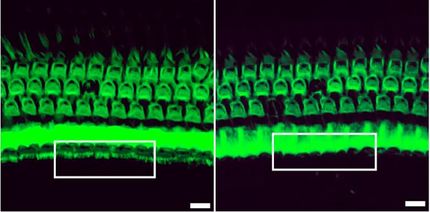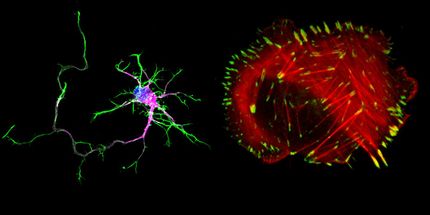Genetic defect triggers endless recycling
Benign tumors in the pituitary gland are responsible when adrenal gland cells secrete the stress hormone cortisol unchecked. An international team of scientists has now succeeded in mapping out in detail the molecular processes that lie behind this.
Patients suffering from Cushing’s syndrome are often easy to recognize: they put on considerable weight around the midriff, their faces become rounder, and their necks sturdier. In addition to these external symptoms, most sufferers also have higher blood pressure, develop muscle weakness, become diabetic, and are extremely prone to infections. In many cases, surgery is a successful treatment for Cushing’s syndrome; if it is left untreated, patients die from infections or cardiovascular problems.
Now scientists from Würzburg, Munich, and Tokyo have managed to make some progress in the search for the triggers of this disease. They have discovered at molecular level the mechanisms that are responsible for causing benign tumors of the pituitary gland to trigger Cushing’s syndrome. A leading role in this was played by the following professors: Martin Fassnacht (Würzburg University Hospital), Martin Reincke (LMU Munich University Hospital), and Masayuki Komada (Yokohama, Japan). They present their work in the current issue of the journal Nature Genetics.
Never-ending hormone secretion
A hormone is the trigger for all the symptoms of Cushing’s syndrome: cortisol – also known colloquially as cortisone. This stress hormone has important roles to play in metabolism; it is only when it is secreted in an uncontrolled manner that it throws the organism into chaos. Cortisol secretion in the adrenal gland is controlled by another hormone – adrenocorticotropin (ACTH), which is produced in the pituitary gland. If a benign tumor forms there, the gland produces ACTH unchecked, thereby raising the level of cortisol. How exactly this happens has been unclear until now.
“We have now been able to show, for the first time, that in the tumor cells of more than a third of patients there is as specific genetic mutation to an enzyme known as ubiquitin-specific protease 8,” explains Martin Fassnacht. This discovery was founded on a precise genetic characterization of benign pituitary gland tumors that produce ACTH, adds Fassnacht’s colleague and one of the lead authors of the publication, Dr. Silviu Sbiera.
Genetic defect leads to a fatal chain reaction
Ubiquitin-specific protease 8, or USP8 for short, assumes a key role when it comes to recycling proteins that are no longer needed inside cells. This also applies to the epidermal growth factor receptor: this is degraded and disposed of in the cell whenever the USP8 gene is not active. As the scientists revealed, the now discovered genetic mutations cause USP8 to remain durably activated. As a result, proteins of the epidermal growth factor receptor that are permanently no longer needed are recycled instead of disposed of as they actually should be. “In a life-threatening chain reaction, first ACTH and then cortisol are produced without restraint,” explains Fassnacht. The USP8 mutations represent a significant discovery. “They open up entirely new diagnostic and therapeutic avenues for treating Cushing’s syndrome,” adds Martin Reincke from the LMU.
The research project brought together the hormone researchers of the University of Würzburg with teams from the LMU Munich, the Helmholtz Center Munich, the Max Planck Institute of Psychiatry in Munich, and the Tokyo Institute of Technology, Yokohama (Japan). The work received support from various parties including the Federal Ministry of Education and Research, within the framework of the E-Rare program, and the University of Würzburg’s Interdisciplinary Center for Clinical Research.
Sights set on Cushing’s syndrome
In the search for the causes of Cushing’s syndrome, Würzburg endocrinologists led by Professor Martin Fassnacht and Professor Bruno Allolio, in collaboration with Dr. Davide Calebiro and Professor Martin Lohse from the Rudolf Virchow Center, have already achieved multiple successes this year. For example, they have been able to point to mutations in a gene of the adrenal gland as a frequent cause of the secretion of abnormally high levels of cortisol. They reported on the findings of this work in the New England Journal of Medicine in February. And just a few days ago they were able to publish further discoveries in the journal Nature Communications: the Würzburg researchers, under the leadership of pharmacologist Dr. Davide Calebiro, further mapped out the exact mechanisms of the mutation in the adrenal gland.






















































